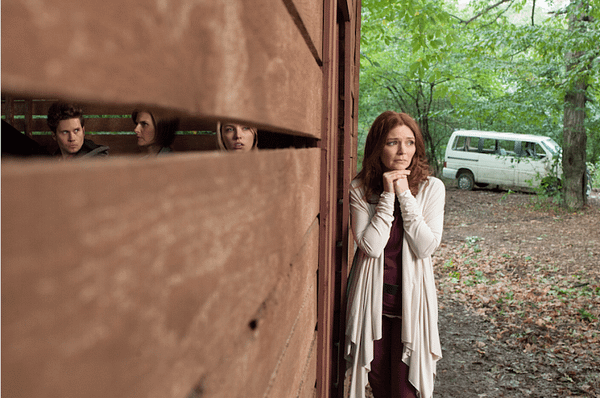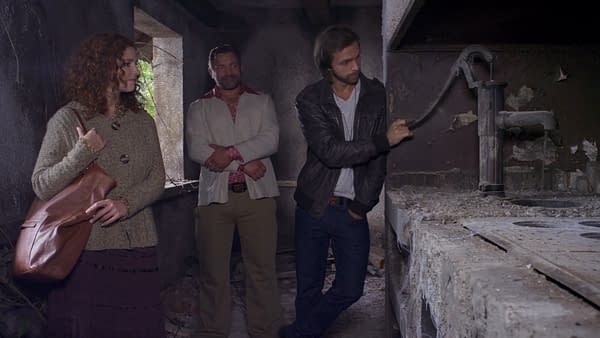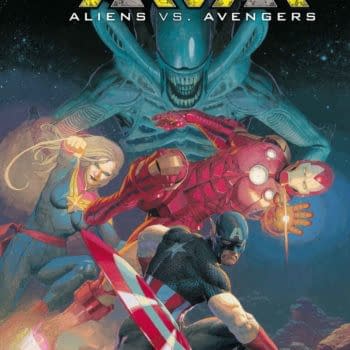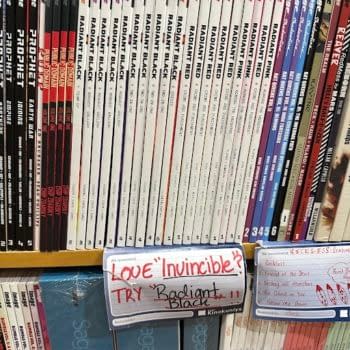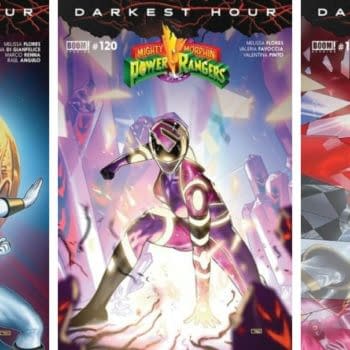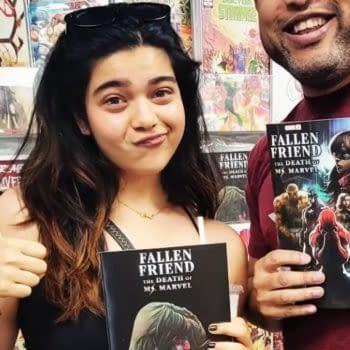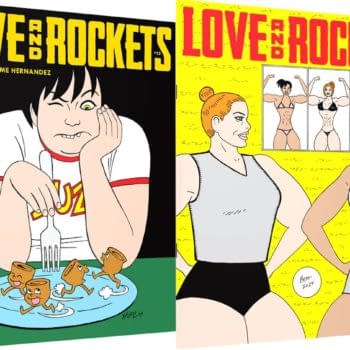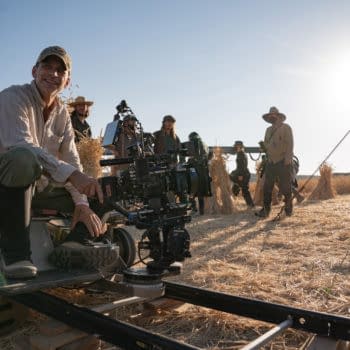Posted in: Look! It Moves! by Adi Tantimedh, Movies | Tagged: entertainment, film, micah wright
Look! It Moves! – Interview with Micah Wright, Co-Writer And Co-Director Of Indie Horror-Comedy They're Watching
Adi Tantimedh writes,
They're Watching is a new found footage horror comedy about a real estate-based reality show following an American couple who buy an extremely cheap fixer-upper in a small Eastern European town in the middle of nowhere. What should be a pleasant, innocuous and faintly imperialistic show aimed at yuppies turns out to be more than that when both the TV crew and couple unwittingly piss off the locals, and what results is tension that escalates into violence and then to an all-out blood bath of Straw Dogs proportions. The distinguishing feature here is that it's also a comedy. A dark comedy that invokes the cheerful nastiness of 80s and 90s low budget horror movies.
And it's bloody funny. Literally. Small wonder when co-writers and co-directors Jay Lender and Micah Wright have had long careers writing comics, video games and animation like Spongebob Squarepants. The movie's default mode is to drily take the piss even as things get worse and worse so you might laugh as much as you're appalled. There's also some pointed social commentary about American privilege, imperialism and barbs about reality TV and yuppies. The main characters are so self-obsessed and preoccupied with their petty squabbles that they miss the looming horrors amassing against them until it's too late. The found footage camerawork is not shaky at all, and the images are sharp and clear on, shot on 4K digital for a professional look as befits a faux-reality TV show aimed at yuppies as opposed to the grainy, pixilated prosumer look of cheaper cameras.
I interviewed Micah Wright about the making of the movie and the hard, practical realities of trying to get an indie movie out to the public and make back its money. The latter is something every filmmaker should know.
First of all, and this is an obvious question: what prompted you to direct your first movie?
Micah Wright: Jay and I have been writing film scripts together since 2002. We've been directing animated work, art-directing comics & graphic novels, and videogames as well. When we came up with the idea for the movie and had a couple of conversations with someone who was willing to fund it, they asked who we'd want to direct it and we just said "We'll do it." I think in retrospect it was inevitable that we'd end up here… there's only two paths to getting a film made these days; sub-$10m budgets and $150m+ budgets. Very little gets made in that giant chasm in between. We knew no one was going to roll the dice on two animation and videogame guys with a $150m budget (this was before Tim Miller on Deadpool, remember), so that left the sub-$10m and probably sub-$5m was more realistic. So we tailored our idea and wrote to the budget.
What inspired the story and subject matter? And the mock-reality show, found footage format?
My wife watches House Hunters International all the time. It's just a pleasant show, but I saw one episode where a guy shopped a house in Italy and spent $26,000. The place was a ruin. But what most intrigued me was that the 2nd house he looked at was great, beautiful, it needed some work, but it was in this cool town in Tuscany with commanding views of the mountains and the valleys… and then the realtor says "Oh, and by the way, this is a summer town." The buyer was confused… what's a summer town. "Oh, on September 1st the 20,000 people you see here end their summer vacations and go home and this town is boarded up and there's only about 100 permanent residents." The guy was understandably like "Nope. Next!" but I couldn't get it out of my head: what if that realtor had been just a little bit greedier and hadn't told the buyer that terrible fact? And then he gets off a plane from Los Angeles in December to do some rebuilding during his winter break and finds his town completely deserted except for a small group of locals who despise him for being there out-of-season? I put it in my "Stuff to work on someday" folder, and then later saw another episode where a woman moved from Australia to Portugal to be with a guy… who clearly wasn't into her. When the film crew went back six months later, she hadn't fixed up a single thing. And the boyfriend was no longer part of the situation. It was sad. And that's when I said "Oh, hey, my horror movie about a man who buys the wrong house works SO MUCH BETTER if it's a woman!" Eight weeks later, we had a first draft.
The movie is a commentary on Americans abroad and the privilege they display when they don't understand the local mores. There's also class commentary here since these are affluent Americans who are intruding on a poor village and buying up their land. Was your intention to comment on that as a sly dark horror-comedy?
Oh, yeah, for sure. It's both of those things, as well as a commentary about American cultural imperialism. Think for a second about Americans; the last time I checked, about 85% of Americans feel that immigrants to America should speak English… but we think absolutely nothing about a show where rich Americans move to foreign countries without speaking a word of the local language. That's really driven home in the film… there are 3 moments where if you're Romanian or speak Romanian, you'll laugh out loud because we absolutely RUIN the plot… the American film crew stumbles across or overhears the locals discussing what's going on in Romanian and if only they had bothered to learn any of the language, they might have survived the film. There are no secrets. That's a technique I stole right from John Carpenter's The Thing: at the beginning of the movie, the "crazy" guy from the Norwegian camp flies in on a helicopter and tries to kill a dog before the Americans gun him down. The entire time he's screaming "Get away from that thing, it's an alien, if it touches you, it'll kill you and eat you!" but he's screaming it in Norwegian and none of the Americans speaks a lick of it.
This was an indie movie shot in Eastern Europe on a small budget. Can you talk us through the production process? The use of digital cinematography here?
We were warned very early on that doing business in Eastern Europe is a roll of the dice. There's a lot of problems with corruption there. Our production attorney said outright to only do business with someone we had worked with previously, or someone who came highly recommended by someone we'd worked with previously. Luckily, we got a really good recommendation for a company in Romania, Alien Film. We cast the American actors here, and picked some possible locations via email photos & videos, worked up a shooting schedule, and began interviewing key Romanian department heads like Production Designer and Costume Designer via Skype. Then we then flew to Romania for several weeks of pre-production; final location scouting, set construction, props design, costume choice, etc. Then the actors arrived, we did a number of table reads and rehearsals and then BAM we were into the thick of it. American movies usually shoot 5-day weeks of 10 hour days, and a medium-sized film might take 12 weeks to film. Batman v. Superman took 7 months just to complete the live-action shooting, then another 18 months for special effects. That's an eternity. We shot this film in 5 weeks. Part of the reason it's possible to shoot in 5 weeks is because we are shooting digitally, not on film. We used RED Epic cameras and shot in 5K… we knew the eventual switch from 2K to 4K would make a lot of films seem dated in their look and we wanted to avoid that, but more, we needed the extra resolution for special effects work. Almost all of our effects are practical effects touched up digitally… there are only a few where they're entirely digital, and those don't contain human beings. I think viewers can always tell the difference between CGI and actual humans. Yes, we have some insane stuff that could never happen in real life, and those things are CGI, but when a guy gets knocked over a barn or set on fire, that's real stuntmen laying their lives on the line.
The hardest thing for indie movies these days is marketing and eyeballs. Big tentpole releases from the studios tend to bury indies through the sheer weight of their advertising. You've been active promoting it on social media, and it's been getting good reviews, including from the hard-to-please Village Voice and the Horror site. What are your thoughts on making back the money on THEY'RE WATCHING? How have you factored in post-theatrical sales like DVD and streaming?
Well, I think the number one lesson we learned is that anyone can make a movie… but not just anyone can distribute a movie. I read recently that over 5000 films of any sort are completed every year. 1500 of those film were submitted to Sundance. Of those, 600 received some kind of distribution. Of those, about 250 movies actually run in theaters every year. So it's exciting to have already beaten the odds and run in theaters, even if it's just for a week or so.
We are a real independent film… in an era where "independent" means a film from a company like Fox Searchlight, a division of 20th Century Fox which spends $30m in production costs and another $20m in advertising. We didn't have $20m to spend on advertising, so we chose to go day-and-date with the film, meaning we are in theaters and simultaneously available through sites like iTunes, Amazon, YouTube, Google, and all of the cable/satellite Video On Demand services. There are a couple of reasons to do this; publicity is one. For the most part, film reviewers at major papers won't review movies which premiere On Demand. Secondly, if you don't have millions in advertising, generally you can't pull mainstream audiences into theaters. Finally, a theatrical run, however small, will bump the pricing of the on-demand. If you premiere On Demand with no theatrical accompaniment, the most you can charge is $3.99… by being in theaters simultaneously, we're able to bump that to $6.99. Since most of our income will come from digital platforms, it makes sense to do this. The downside to day-and-date is that the major theater chains DESPISE day-and-date releases… the people who run major theater chains like Pacific Theaters are terrified that someday Disney will premiere "Avengers 4" day-and-date for $60, and that will be the death knell of the local theater. I think that's a bit paranoid… going to the theater isn't only about seeing the newest movie, it's also a communal experience. Everyone's laughing at the same time, everyone's screaming at the same time, cheering, crying, what have you… you're sitting in the dark experiencing emotions with strangers and it's not the same when you watch movies at home, no matter how big your home television is. It's like secular church for a film lover like me.
After our initial 90-day run at the $6.99 price point, we will drop down to $4.99 and be there for another 90 days or so for Video On Demand & iTunes. At 90 days we will also go out for sale on DVD through Anchor Bay. Because we ran theatrically, we will be for sale in Wal-Mart and at a higher price point than movies which premiere on DVD. We will also simultaneously go to Netflix in the US/Canada. That's indicative of the collapsing of the traditional "tiers" of distribution. From theatrical to Netflix in 90 days would have been unheard of just five years ago.
The thing which has changed the most recently in independent film is Netflix. They push hard now for as much as they can get. My distributor described it as "Swimming Upstream" — they initially requested in negotiations that we go simultaneously in theaters and on Netflix, which was just financially unrealistic for us… there'd be no way for us to make money if we did that. But the pressure is there because Netflix is so powerful and in so many homes, and because so many films are getting made these days, good or not… remember those 5000 films we mentioned earlier, 4400 of which didn't find any kind of distribution? ALL of those filmmakers are willing to "premiere" on Netflix for NO MONEY. I even heard a story of a director who was willing to pay Netflix to distribute his terrible film. That's a real crabs-in-a-bucket situation where indie producers are cutting their own wrists, and in so doing, destroying your ability to make money as well. Then there's the issue of Netflix and worldwide… most films are financed by pre-selling foreign rights to as-yet-unmade films. Foreign distributors look at your cast and your writer & director's track records and pre-pay some amount of money for the right to eventually distribute the film in, say, Italy, when the film is finished. But with Netflix pushing out into more and more countries, they're chewing into the ability to do pre-sales because those foreign distributors don't see any way to make a profit if the film is going to be running worldwide on Netflix. There's a Chinese saying: "May you live in interesting times." It's actually a curse… like, "I hope your life is so complex that you drown in the minutia of it and never get a moment's sleep from fear that you've missed a detail." Right now, the independent film world is DEFINITELY living in interesting times. There's no knowing if it'll even be here in another decade, the financials are so shaky at the moment.
Do you have plans to make more movies?
I do. I've watched it with crowds of strangers now and they laugh at the right times and shriek at the right times. I think several of the reviews we have gotten demonstrate that we've made a good film. Not all the reviews are great, they never are, but for the most part our negative reviews tend to start with some variation of the phrase "I hate found footage movies," so where can you possibly go from there? We got good reviews from the Village Voice and the New York Times, which made me happy, some other outlets that I respect didn't like it, which is disappointing. Several other outlets just didn't review us… I got the feeling that Rolling Stone would have liked us, but like everyone else, they're drowning in content to review. Same with Entertainment Weekly. Some of the horror sites loved us, others didn't. There seems to be two types of horror fan; the ones willing to wait through the slow burn, and the ones who just want 90 minutes of people being murdered… the ones who enjoy tension as much as gore tend to like our movie, those who were expecting Hostel 5 don't. It is what it is. Since you can never predict what an audience is going to like, you have to try and please yourself. Meanwhile, I read the reviews with one criteria in mind; "Do I see validity in this complaint or suggestion?" Every mistake is a learning opportunity, and I've discovered a few things in this film that I will do differently next time out.
Have you thought about different types of filmmaking in the digital age, like short form serials that would run on sites like YouTube or Vimeo?
I'm always interested in anything that disrupts the current paradigm. The system as it exists was built exclusively for the benefit of major studio pictures. There's just not many ways for independents to break through to a huge audience without crawling into bed with those corporations… and their accounting structures are very suspect. I heard from one producer that his famous $15m-budgeted studio independent film, which grossed over $110m at the box office and was nominated for two academy awards, according to his distributor has never earned a single penny. There's just a lot of fraud and corruption in the Hollywood system as it currently exists, and digital distribution like we are using is one way to bypass that system in many ways, but not in all ways. You still need a traditional system publicity company, you still need to be in some theaters, you still need to work the festival circuit, etc. etc. Filming shorts on YouTube requires such an extensive viewer-building exercise… you can't really make money until you're in the hundreds of thousands of subscribers, but getting there is a long trek through a desert where you're hemorrhaging money producing the content. Then there's the audience viewer span… I read that YouTube suggests to their top video makers that they should keep everything under 2 minutes 30 seconds. That's not a lot of time to create any kind of character depth or to tell any sort of story. I'm always interested in it, and I have a couple of ideas I'd like to execute in the space, but it'll take some startup funding of some kind, and that's as hard to get as a studio distribution deal.
They're Watching is in limited theatrical release in the US and on VOD like iTunes.
Watching away at lookitmoves@gmail.com
Follow the official LOOK! IT MOVES! twitter feed at http://twitter.com/lookitmoves for thoughts and snark on media and pop culture, stuff for future columns and stuff I may never spend a whole column writing about.
Look! It Moves! © Adisakdi Tantimedh


